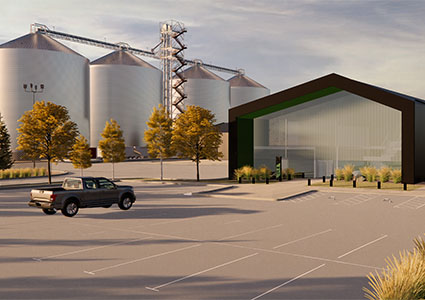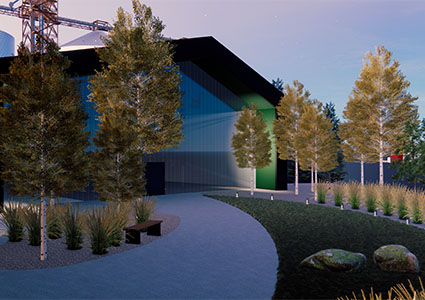With several projects underway, Green Impact Partners is leading the rise of RNG across North America
With a focus on renewable natural gas (RNG) and bio-energy projects, Green Impact Partners is on a mission to accelerate a sustainable future by turning waste into renewable energy. Officially established in 2021, the company’s mission is to acquire, develop, construct, and operate facilities that not only produce energy, but also play a significant role in waste reduction and lowering emissions.
RNG is an innovative clean energy source increasingly added to existing gas distribution systems and used in everyday applications to reduce conventional gas consumption. While just 0.1 percent of the current US natural gas supply is RNG, this figure is set to rise to ten percent by 2040, and with billions in shovel-ready projects across North America, Green Impact Partners is poised to capitalize on this increase.
 Made using organic waste like compost or manure, RNG is produced by capturing and purifying biogas released from the waste. Although the company is not limited to specific biogas sources, biogas is most often captured from agricultural waste, food waste, wastewater treatment plants, landfill, and residential or commercial organic waste.
Made using organic waste like compost or manure, RNG is produced by capturing and purifying biogas released from the waste. Although the company is not limited to specific biogas sources, biogas is most often captured from agricultural waste, food waste, wastewater treatment plants, landfill, and residential or commercial organic waste.
Green Impact Partners currently has three key projects either under development or in operation: the Future Energy Park in Alberta, Canada, GreenGas Colorado in Weld County, Colorado, and Iowa RNG, which is still in the early planning stages. The Future Energy Park, a net CO₂ negative renewable biofuels facility, is set to be one of North America’s largest waste-to-energy RNG projects once construction begins in 2025. GreenGas Colorado, on the other hand, is a dairy-to-pipeline quality RNG project converting manure into RNG through an anerobic digestion and gasification process.
Circular economy concept
To learn more about these projects and how Green Impact Partners operates, we’re joined by CEO, Jesse Douglas, who boasts more than 20 years of successful entrepreneurial experience in the energy landscape. “Although Green Impact Partners was officially formed in 2021, a significant amount of work around our projects was happening in the background for over five years beforehand,” he opens. “The nature of our projects means we require an extensive planning, investment, and approvals process before we break ground. I have personally invested capital along the way, as have the other directors, to expand our portfolio and enhance existing projects.
“From a purpose perspective, the formation of the business was driven from a lifetime of experience in the energy and construction sectors, combined with a desire to accelerate cleaner and greener energy. We experimented with several technologies and concepts, eventually deciding to focus on biofuels, as we believe this area is where we can make the biggest difference to decarbonizing energy while also positively impacting the food and agricultural industries by utilizing waste.”
Elaborating on the status of the Future Energy Park, Jesse continues: “The Future Energy Park reflects the flagship of what can be done in waste-to-energy projects if we combine technology with the desire to utilize waste streams. We take waste and industrial waste wheat to produce bioethanol using European ethanol technology, which is then processed into RNG.
“Each year, approximately 11-to-13 percent of wheat produced in Canada does not meet Grade A standards, meaning it is not suitable for human consumption, so we’re not only producing renewable energy at the Future Energy Park but also repurposing product that would otherwise go to waste. We’re creating a circular economy concept and we’re also capturing and sequestering the carbon that is emitted during the process of creating biofuels.
“In a similar way to how we repurpose waste products to produce biofuel at the Future Energy Park, we’re converting organic waste into RNG at GreenGas Colorado, by using anerobic digestion and gasification processes,” he adds. “We’ve secured long-term feedstock supply from two national dairy producers with onsite gas offtake and connection, from which we take around 250,000 gallons of manure on each site every day.”
Colorado, by using anerobic digestion and gasification processes,” he adds. “We’ve secured long-term feedstock supply from two national dairy producers with onsite gas offtake and connection, from which we take around 250,000 gallons of manure on each site every day.”
Positive processes
With the percentage of RNG in natural gas supply in the US set to rise from 0.1 percent to ten percent by 2040, Green Impact Partners must prepare to meet such demand. “From a technology and access to waste perspective, we can roll out and repeat our projects, but we’re cautious not to grow too quickly,” Jesse explains. “We want to ensure that we boast the capabilities to get a project operating successfully, as well as making sure we have enough financial and human capital to execute our strategy. Along the way to being sustainable, we want to provide great employment, and for that, we need great people and a great culture. We don’t want to lose the positive culture and thoughtful decision-making processes we’ve worked so hard to establish.
“In terms of the future, there is some political uncertainty in North America right now; in fact, the only certainty is that we have political uncertainty. We have a long list of projects, so we’ll have to wait and see how those fit into the next government’s agenda and mandate following the transition in January. There’s also an election in Canada later in 2025 and these policies impact our project detailing, scoping, and path to profitability, meaning we may have to tweak some aspects of our projects following these political changes,” Jesse concludes.
